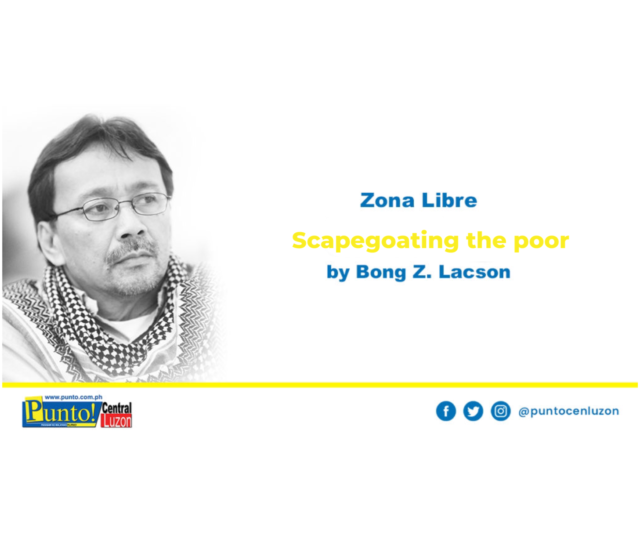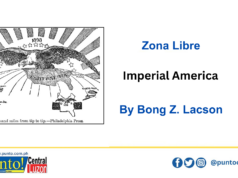SOCIAL DISTANCING fomented class divide. So, I remember postulating here at the start of the enhanced community quarantine.
Top-of-mind then was that the upper and middle classes could well afford to stay put at home having the ways and means not only to live out the ECQ, but even to revel in it. Which, to the lower classes is simply unaffordable, caught as they are in the daily grind of existence.
In some rare display of wisdom, this government proposed – and did dispose too – to bridge the divide, even if temporarily, with its social amelioration program (SAP) of cash assistance principally to the poor.
Instantly instigating a middle–class backlash: We suffer from the ECQ too, why should the “poor” get all the help?
Damningly disdaining: From our blood, sweat and tears, the government draws the taxes it now feeds to social parasites.
The SAP there seemingly sapping, instead of uplifting,whatever remained of inter–class goodwill. Verily, tristia de alterius bonitate – grief for another’s fortune – Cain’s bitterness over God’s favoring his brother Abel’s sacrifice leading to the first fratricide, as Augustine reflected in his City of God.
The set bias against the “indolent poor” progressively calcifying at every social media upload of 4P-beneficiaries caught gambling away their P6,500 cash aid within an hour of receipt, as happened in Cabanatuan City; of one tambay in Metro Manila promptly taking his to the neighborhood pusher for some sachets of shabu; of others splurging theirs in alcohol, sabong, or some other vices elsewhere.
As there can be no justification for behavior so patently wrong, so too can these individual aberrations be visited upon the whole class whence they sprang. But then, predilection – against the poor in this wise – can only be pertinacious, or it is not.
Not dissimilar are the eyes of prejudice that sparkled in perverse glee at the Tondo shantytown razed to the ground by conflagration, seen as some chastisement for the poor residents’ utter disregard of the ECQ commandments.
Sheer schadenfreude – finding pleasure in the misfortune of another – characteristic bourgeois snobbery there, finding (ir)rationalization, impacting (un)justification in that elitist thesis: Poverty is their choice.
Compelling me to raise this response anew, proper in time to the issue at hand despite its publication over 14 years ago in the now defunct Pampanga News, issue of March 23-29, 2006. Aptly titled too:
The masa antithesis
Hindi mangmang ang masang mahihirap. Sila’y pinagkaitan lamang ng tamang pagkakataon upang ganap na umusbong ang kanilang katalinuhan, ng akmang kaganapan upang malinang ang kanilang karunungan – pagkakataong pinigil ng hagkis ng kahirapan; kaganapang sinupil ng hataw ng pang-aapi’t pagsasamantala ng mga naghahari-hariang uri.
That “the incompetence of the masses is almost universal throughout the domains of political life…” is a fundamental fallacy in the bourgeois postulates on the people, as contrasted to the competently propertied People…
The masa response: There is no inherent mass incompetence among the people: there is mass oppression, exploitation, and deprivation that caused incompetence.
Premium to the existence of class exploitative societies is the oppression of the people. Of the highest priority is the reduction of the people to their basic animal instincts, the deprivation of their natural rights as human beings, in order to best serve – in the bourgeois interest – their principal purpose as nothing more than tools of production.
Sa kaisipang elitista, ang masa ay kawan ng baka’t kalabaw na isinisingkaw sa mga bukirin, sa mga planta’t pabrika upang mabigyan tugon ang lahat ng mga pangangailangan, upang masustentuhan ang lahat ng luho at kapritso ng uring peti-burgis. Tunay ka, kasama: Tamad na burgis na ayaw gumawa, sa pawis ng masa ay nagpapasasa.
Deprivation damns the people to incompetence, dispossessing them of the necessary knowledge and skills to rise above the lot pre-ordained for them by the ruling class.
Born poor. Live poor. Die poor. An animal existence. To the elite, that is the
masa destiny. A vicious cycle with neither definitive end nor fixed beginning.
Of that, it is not.
Incompetence, as we have stated, is reared upondeprivation which in turn is rooted in exploitation which spawns from oppression. To make possible the elimination of incompetence among the people then, exploitation need to be uprooted.
Ang pagkapantay-pantay ng mga mamamayan ang sandigan ng isang demokratikong estado. Ang mga kalakarang piyudal, pagbubusabos sa mga anak-pawis, paniniil sa mga anak-dalita ay walang puwang dito.
So government exists for the purpose of preserving the status quo. This does not cover though the preservation of the system of class exploitation.
Ang pagtaas sa antas ng pamumuhay ng mga mamamayan ay hindi lamang pangunahin kundi sagradong gampanin ng pamahalaan. Lakip nito ang pagbibigay puwang sa pinakamaliit at pinaka-aba mang mamamayan ng bahagi sa mga gawain at pagkilos na tuwirang tumitimo sa kanilang buhay. Anumang kaganapang taliwas dito ay isang kabalintunaan sa demokratikong estado.
The bourgeois thesis of governance as a monopoly of the propertied class has been – rightfully – long consigned to the dustbin of history.
There is though an emerging new elitism. This, the masa should fight with a determined populism.
NO, THIS is not romanticizing poverty. Much less beatifying it – the Beatitude spoke of poverty in spirit – of it being free from things of this world, as requisite to possession of a place in the Kingdom of Heaven.
Yes, this is politicizing poverty in all its sordid reality of human deprivation.





